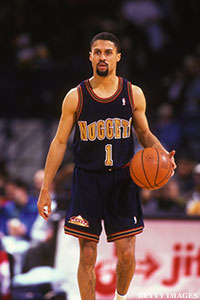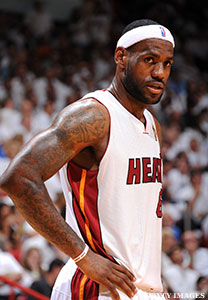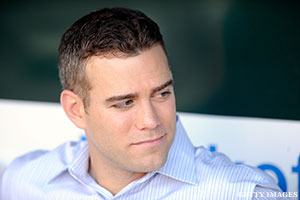
It was a big deal when Chris Jackson found Islam. While playing for the Denver Nuggets in 1996, Jackson, who had already changed his name to Mahmoud Abdul-Rauf, began to question some things, like whether or not "The Star-Spangled Banner" really symbolized all the values contained in the song. Mahmoud finally decided that "the flag represented tyranny and oppression." Mahmoud added that standing for the anthem was a form of "nationalistic worship" forbidden by his religion. So he decided not to stand while it was played. And this killed the buzz not just for the Rocky Mountain faithful, but all over the country.
Before a Nuggets game against the Chicago Bulls, 20,000 people walked into the United Center carrying American flags. Most were hand held, but some people draped their bodies in Stars and Stripes. During the anthem, they waved their flags in Mahmoud's direction. This peculiar scene of hostile patriotism played in each and every arena the rest of the '96 season. I watched the highlights each night. And each time I saw the crowds directing their every action toward Mahmoud, I kept thinking one thing: "Man, he owns those people."
LeBron James owns Cleveland, and apparently most of the country too. How else do you explain so many people directing so much negative energy toward one man whose life choices have absolutely no effect on their personal lives?
Once again, American values have come into play. But it's not from the understandably volatile conflation of religious zeal and patriotic fervor. We're mad at LeBron James because a year ago, he did the unthinkable. He hijacked the prescribed narrative for his life.
You know how the story was supposed to read. James was supposed to spend his entire career in Cleveland, in his home state, where he had been reared for the sole purpose of elevating the hard scrabble enclaves of Ohio. He was supposed to win MVP awards and scoring titles and all that goes along with transcendent talent. And in the end, his failure to win a championship would render an otherwise stellar career incomplete. This is how others would define his legacy. So reads the formula.
Surely, LeBron James heard this. Surely, he heard it's not about individual accolades, it's all about winning titles. So when he, Dwyane Wade and Chris Bosh put their heads together, they came up with a plan: They wanted to win championships, together. Of course for three perennial All-Stars this meant giving up some things -- like money, top billing on the marquee, and the ball. But in team ball these are all good things, right? That's the very foundation of team sport -- the individual becomes smaller for the sake of the greater good?

When Tom Brady restructures his contract to make room for a teammate, we all applaud the gesture. It demonstrates his vision and unselfishness. Doesn't that apply here?
James struggled in Game 5 of the NBA Finals, turning the ball over as he attempted one ill-advised pass after another. He looked every bit the big dog trying to be the set-up guy. For his willingness to play a supporting role, one writer called James a "beta male." This same scribe said this was the time for James to take over and to be "selfish."
This was more evidence that a change in the script has made us chase after a displaced water dish.
Perhaps this would make more sense if we considered the practical element at play here. Sometimes in team sports, accommodations are made -- even by superstars. When he signed with the Yankees, Alex Rodriguez moved to third because the law of any infield dictates there can be just one shortstop.
And in crunch time, there's only one ball and thus one person who can possess it. In Super Bowl XXIII, Jerry Rice watched from the other side of the field as John Taylor made the winning grab. At that particular moment, Joe Montana and Bill Walsh considered Taylor the better option. It didn't mean Rice was anything less than the greatest ever, but Taylor was, you know, open. So he got the ball. This happens in sport.
As the owner of one championship ring, Wade told his teammates in essence that "he had been here before, so he would "take the lead" this time. I add that "this time" because there will most likely be a next time, during which James, Bosh or some yet to be determined teammate, will take the final shot.
I wonder if James' youth has something to do with all the resentment. Perhaps folks don't like youngsters making such bold decisions. But then again, when a 28-year-old Theo Epstein started making moves to assemble what would become the Red Sox first world championship in 86 years, he was called a visionary, a genius -- all the descriptors that probably should accompany a brash, young, go-getter.

So why is the entrepreneurial vision of a 26-year-old James, and partners Wade and Bosh, so completely eclipsed by the resentment for their singular desire to win championships? Maybe it's not just that the narrative was changed. If the Heat fail to ever win a title, the story can be amended and edited to read as it was meant to be. So perhaps that's not the problem.
Perhaps the real issue here is that the profile for the young, inner city athlete is in danger of being blown to smithereens. You know the one: The young black kid who's raised in the 'hood has but one shot at success. It comes on the court or playing field. So he avoids the usual trappings of thug life that will lead to his inevitable doom. And when he makes it to the big leagues, we all revel in his success. We celebrate the rags-to-riches, pull-oneself-up-by-the-bootstraps thing, because we Americans love nothing more than the determined pulling up of the bootstraps.
I've always thought it odd that after overcoming the requisite humble beginnings, we expect ... well, a lot more humility. We expect, no, we demand athletes like James to say all the right things and do all the right things, to grin and gleefully jump through all the little hoops that accompany fame. It's called being "gracious." And most athletes comply, because it is after all, good for business.
But it seems a rather odd paradigm. I mean, when guys like James or Wade, or a sizeable portion of the NBA for that matter, were adolescents leaping over tall buildings in the blighted streets of despair, we didn't really care, did we? We were too busy with our own lives. But once they make out of the 'hood, it's like they owe us something. Neither Akron nor Cleveland gave LeBron James his talent. God provided that. Akron and Cleveland just got a front row seat.
And that's why James, early in his career, did all the right things. He complied with the program. Why wouldn't he? He was handed a great script.
Then came his decision to leave Cleveland. This spawned The Decision. Of course these are the days when millions of Americans feel the most mundane aspects of their lives are worthy of sharing with anyone who might be listening. So James'Decision show was little more than a televised twitter post. Of course it was self-indulgent and painful to watch, but at least he was sharing information vastly more compelling than the details of his morning commute.
That night, James revealed that three young, virile men would join forces because this would give them the best chance to win. And this has vexed some people to the point where the entire Heat franchise has come to symbolize all that is evil. But maybe if we step back this summer and size it up in objective fashion, perhaps we'll see that this as a sound business decision that incorporates all the values we supposedly hold sacred in sport.
Failure to do so means that LeBron James owns not just the rights to his story. He owns us too.




